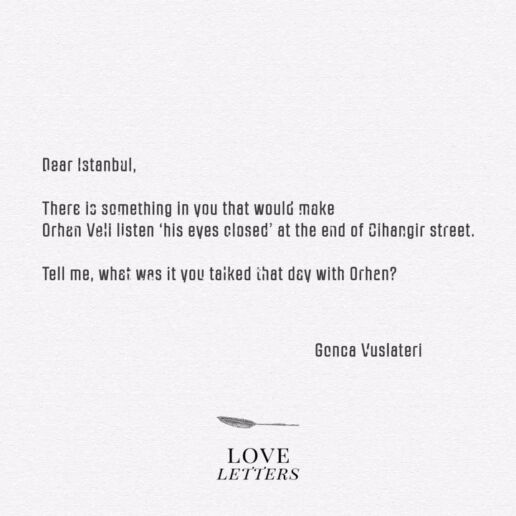GONCA VUSLATERİ
Dear İstanbul… My beautiful city… My favorite…
What you call “value” is somehow measured by the remembrance that the value is underestimated. You cannot explain presence unless you use absence as a base. One can pick an intention, a standard, pleasure, contentedness, a poem behind even the most pretend smile.
Istanbul, you are a bon vivant, established city. Parasites and slackers can never ever achieve the dance of the chatty. You are a crowded poem; all your words migrated from a different culture.
Here, I am standing in front of Haydarpaşa Train Station – a wonderful unity of German and Italian mastership. I am 16 years old, sitting on the stairs for the first time.
These are the times when our only ‘attraction’ is to skip the school and go to Haydarpaşa with friends… From where we sit we watch the seagulls landing on the opposite shore while old men who fell asleep at the Train Station bar eat Turkish bagels and cheese while drinking tea. It was the time the City of Angels (1999) came out to the theaters just recently and I memorized Haydarpaşa Train Station as the place where all the angels on duty in Turkey gather. Is there any seagull which does not miss the ferry’s departure time? Those which go to the Beşiktaş Pier leaving you when the ferry gets close to the Haydarpaşa…
This place survived two grand fires. The service is temporarily stopped in 2012. Four floors are completely collapsed. The last night, we were together on the sadness of an Ankara train with no self-awareness. We were going to Ankara with the wagon-lit. There were Italians in the bar. They were talking loud; they were saying “cheers” while their glasses were raised. They were talking about our cheer. We said “No sir”. This stain is for all of us. Cheers to you…
There was an old man there, almost at the same age with the station. “This is the last day of my duty” he was saying. With his eyes looking outside the window for the first time, he pulled a wagon full of Turkey’s smell off its hook with the heart-throb rumble of the rails. Then things went off the rail. Isn’t it true, İstanbul?
Views from the Stairs
It is a historical day in Kuzguncuk.
I was accepted in the Conservatory. Ah! What an excitement! You were there with me that day and how we were cold just because you weren’t in the mood… We walked away from the shore; we sat with one of my friends on the endless stairs where are breaths run short. “Look” she said. “Bülent Emin Yarar lives here.” I got excited. ‘Çayhane’ was not yet on the stages in İstanbul. There are still many years until ‘the Professional’ wins our hearts. We are looking at you from the Kuzguncuk stairs. The night resembles the song ‘Eftelya the Mermaid’. It’s like the sea sparkles sing at an open air concert. We are drunk in your endless conversation. People who went out reading poems… The brewing of the woman who was a costume chef in Yeşilçam… The retired dramaturge woman’s home-cooking shop named ‘Betty Blue’… Gürol Ağırbaş’s playing the guitar while sipping from his rakı on his balcony… İstanbul gentlemen who may one day be shaken by Birsen Tezer…
Conversations on the Fifth Floor of the Cihangir
Kuzguncuk… The shore of friendships which are mixed with Turkish bagels, tomatoes, olives, thyme and olive oil in transparent bags, go down the transparent people’s throats and probably are not treated without tea.
It is the backstage of many poems and young art students who stare at Cihangir like it is America. Cats are the watchers of its streets. If you didn’t see the same cat in the same street once more, then it means that there is danger in the street. When the compote’s fat is set, you get upset Istanbul, I know that. Kuzguncuk becomes a pole; young men with almond faces become demons so that the justice can pass by the pole safe and sound. I like Kuzguncuk, too. I visit it like every tourist human being on this earth on which we are not permanent. Because you are more naïve, there… You keep on the right side of me, I know…
One can say that there is something with you. Despite all this chaos and this entire intimate confusion, one does not feel sick and the neighborhoods and the side streets don’t hurt each other… Despite all these things!
We experience productions, failures, wars that extend to centuries in order to take one step that is slow and secure just like we live in an elephant’s body. Our fastest confrontations render us the least fertile century but there is balance in the nature! We know that. This wounded one carries you for a reason. One looks for a talisman in you that matures one’s self after each historical artifact dries up and falls down and each historical moment is deleted.
These are too many responsibilities for a city… Really, how did you manage that? That’s why each time I thought about leaving I rehearsed death to myself. Because, there is something… In Cihangir, on the fifth floor of the last building on Cihangir Street, there is something with you that make Orhan Veli say “eyes closed”. Indeed, what did you talk about with Orhan that day?
Memories in Galatasaray’s Bibliopoles
For instance, there is Vahap Usta* the bibliopole. He was one of your oldest bibliopoles. Your oldest confidant… I was 19 when I met him and Vahap Usta was really old then. He was selling the last books he had. Cemal Süreyya, Edip Cansever, Yaşar Kemal, Turgut Uyar and many others came to his store in Galatasaray, read in front of his door the painters’ sketches, notes, historical stories kept in hidden corners of Europe, drinking weak tea. Vahap Usta was a man who many actors look for. When he wanted to press his own book, they pleased him by ‘printing’ it. “If you put the pages together, make it readable and if you are curious about the next page – you will be OK without a publisher. Everyone will read you” he used to say. This transparency of him used to kill me. He was selling to people he choose the 10 books he had because he promised not to die until he has no books in his store. Sometimes it was hard to earn the knowledge; we dusted our coats on the pavements and with Ustas to be able to say that we know. “People at home are driving me crazy, Usta.” “You are already crazy, my mad Gonca.”
Orphan Stories from Galata
And in Galata, you tell the story of a crowd who ran away from the orphanage. Those bibliopoles bring pickups from Germany to the country.
Hümeyra is still very young when she draws illustrations on those pickups covers. That ‘Kördüğüm (Tangle)’** is not yet resolved. They would leave the Melek Kobra story in Burçak Evren and Gökhan Çuhadar’s room on a Monday. Only later will we know that this girl who died from tuberculosis at age 25 is actually the Ayşe of the first Ayşe Operetta. We would confront the youth stories of Semiha Berksoy or Cahide Sonku in Gülriz Sururi’s childhood memories. However, you would hide your displeasure, İstanbul.
Just like Samiha Ayverdi once told, the sieve of the time would know what to do, wouldn’t it İstanbul? “It won’t stop those who fall and will shake off the rest. What pours out pours out; what remains remains…”
*A Turkish term for addressing those who are experts at a certain craft.
**One of Hümeyra’s most popular songs from 1969.


